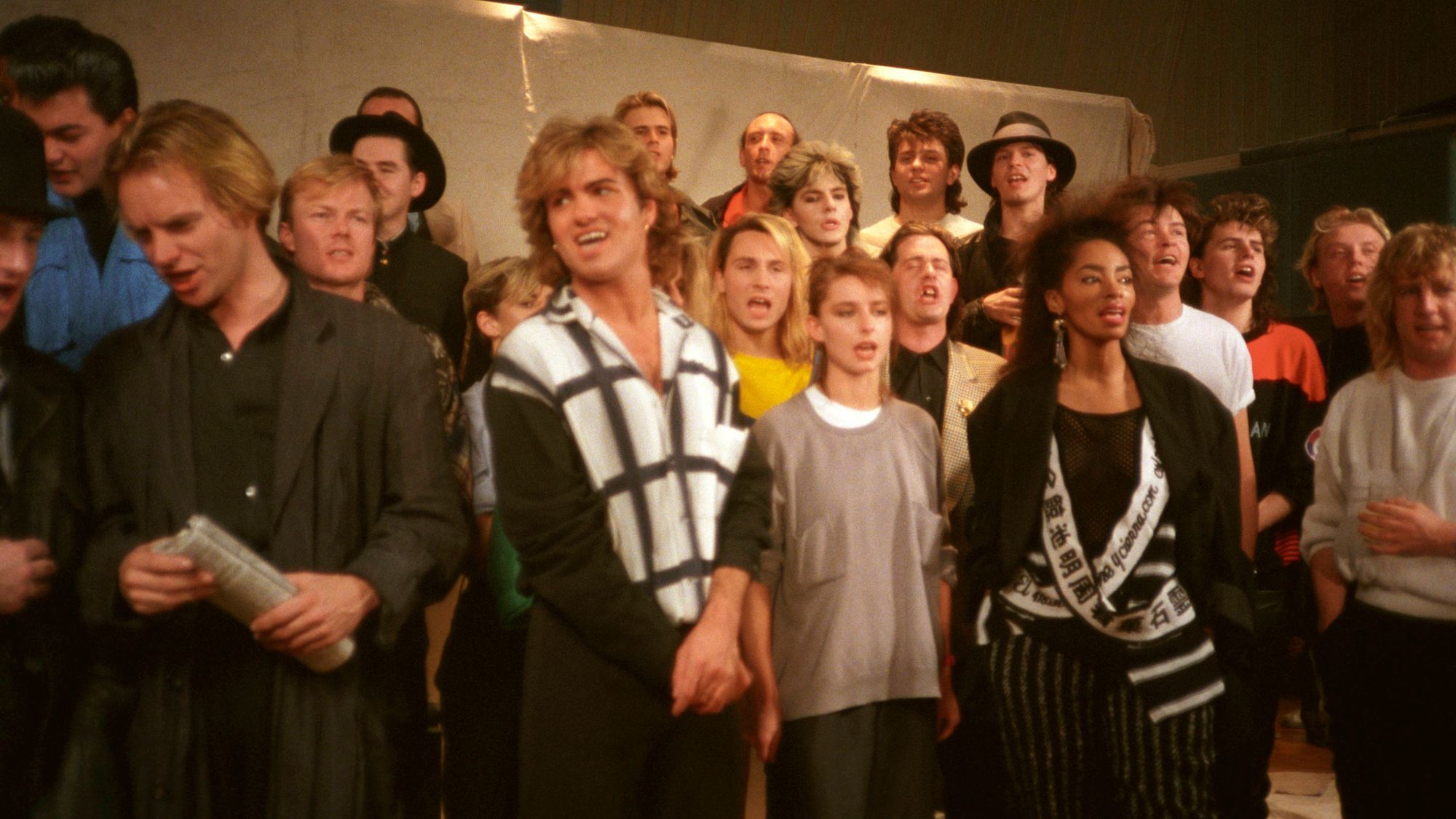Band Aid 40: time to change the tune?
Critics of the festive charity hit say it 'perpetuates racist stereotypes of African people'

A free daily email with the biggest news stories of the day – and the best features from TheWeek.com
You are now subscribed
Your newsletter sign-up was successful
An era-spanning mega mix of the 1984 hit "Do They Know It's Christmas?" will be released this year to mark its 40th anniversary and to raise yet more money for charity.
The new track will blend vocals from different versions of the single, meaning stars such as George Michael, Sinead O'Connor, Bono and Harry Styles will sing "together".
But "not everybody is happy about it", said London's The Standard. The 40th anniversary remix has been "denounced" by Ed Sheeran, who claimed his voice had been used "without permission".
The Week
Escape your echo chamber. Get the facts behind the news, plus analysis from multiple perspectives.

Sign up for The Week's Free Newsletters
From our morning news briefing to a weekly Good News Newsletter, get the best of The Week delivered directly to your inbox.
From our morning news briefing to a weekly Good News Newsletter, get the best of The Week delivered directly to your inbox.
Sheeran appeared on the 30th anniversary version of the track in 2014, but in an Instagram post the singer said his "understanding of the narrative associated" with the song had changed since then. Given the choice, he said, he "would have respectfully declined the use of my vocals".
Sheeran's comments have reignited a long-standing debate as to whether the 1984 song should remain a staple of the festive season. The Ghanaian-English Afrobeats star Fuse ODG said he turned down an invitation to appear on the 2014 release "because I recognised the harm initiatives like it inflict on Africa" and called for the BBC to cancel an upcoming documentary celebrating the single.
'Embarrassment of a song'
The original release of "Do They Know It's Christmas", by an all-star line-up of artists entitled Band Aid, was "masterminded" by Boomtown Rats frontman Bob Geldof, who worked with Ultravox singer Midge Ure, said The Guardian.
In the last 40 years, it has been "praised by some as a triumph of charitable fundraising and festive songwriting", topping the charts and raising millions for famine relief in Ethiopia. However, in recent years it has also been "condemned" as "the most high-profile example of white saviourhood in pop".
A free daily email with the biggest news stories of the day – and the best features from TheWeek.com
Put simply, the festive hit "has not aged well", said Deadline in 2023. The lyrics, say critics, "perpetuate racist and patronising stereotypes of African people", and although later releases have "tweaked" the wording of some parts, the original version "remains the standard" for the airwaves every Christmas.
"Can we please cancel one awful Christmas song?", asked Ije Teunissen-Oligboh in The Independent in 2022. First of all, "they damn well do know it's Christmas". Every year, Britons from the African diaspora have to hear this "embarrassment of a song" and are "expected to smile, ignore it or even sing along".
While the intention of Geldof and Ure should undoubtedly be "lauded rather than criticised", ultimately "the execution was appalling and helped to perpetuate stereotypes and misinformation". At best, the song is "problematic"; at worst, it is "a racist and ignorant creation".
'Changed the charity sector'
For his part, Geldof is not inclined to take criticism of the hit on board, often giving it "short shrift", said The Standard. "This little pop song has kept hundreds of thousands if not millions of people alive", and because of it many can "sleep safer, warmer and cared for tonight", said Geldof in response to an article published on The Conversation.
The 40th anniversary of Band Aid will bring with it a new opportunity to raise money for charity this Christmas. Over the past four decades, it is believed the Band Aid Charitable Trust "has raised more than £140 million in total", said the BBC. The hit also spawned Live Aid, the 1985 concert, and Live 8, a similar project in 2005.
But in this sense, the original song and the Live Aid concert "were watershed moments for the wider charity industries", said Colin Alexander, senior lecturer in political communications at Nottingham Trent University, on The Conversation. "Fundraising became much more of a spectacle."
Celebrities now view charitable endorsements "as a key part of their star profile", while instances of "poverty porn have also become commonplace across the charity sector". This is ultimately harmful as it reduces the recipients of donations "to mere 'victims' rather than full humans looking for agency".
As the 40th anniversary gives rise to another re-examining of "the Band Aid format", said Alexander, we are "arguably less knowledgeable" about global suffering, "and in no better a position to put an end to it".
Rebekah Evans joined The Week as newsletter editor in 2023 and has written on subjects ranging from Ukraine and Afghanistan to fast fashion and "brotox". She started her career at Reach plc, where she cut her teeth on news, before pivoting into personal finance at the height of the pandemic and cost-of-living crisis. Social affairs is another of her passions, and she has interviewed people from across the world and from all walks of life. Rebekah completed an NCTJ with the Press Association and has written for publications including The Guardian, The Week magazine, the Press Association and local newspapers.
-
 How the FCC’s ‘equal time’ rule works
How the FCC’s ‘equal time’ rule worksIn the Spotlight The law is at the heart of the Colbert-CBS conflict
-
 What is the endgame in the DHS shutdown?
What is the endgame in the DHS shutdown?Today’s Big Question Democrats want to rein in ICE’s immigration crackdown
-
 ‘Poor time management isn’t just an inconvenience’
‘Poor time management isn’t just an inconvenience’Instant Opinion Opinion, comment and editorials of the day
-
 Bad Bunny’s Super Bowl: A win for unity
Bad Bunny’s Super Bowl: A win for unityFeature The global superstar's halftime show was a celebration for everyone to enjoy
-
 Music reviews: Ari Lennox, Lucinda Williams, and A$AP Rocky
Music reviews: Ari Lennox, Lucinda Williams, and A$AP RockyFeature ‘Vacancy,’ ‘World’s Gone Wrong,’ and ‘Don’t Be Dumb’
-
 Bad Bunny, Lamar, K-pop make Grammy history
Bad Bunny, Lamar, K-pop make Grammy historySpeed Read The Puerto Rican artist will perform at the Super Bowl this weekend
-
 Music reviews: Zach Bryan, Dry Cleaning, and Madison Beer
Music reviews: Zach Bryan, Dry Cleaning, and Madison BeerFeature “With Heaven on Top,” “Secret Love,” and “Locket”
-
 The best alcohol-free alternatives for Dry January
The best alcohol-free alternatives for Dry JanuaryThe Week Recommends Whether emerging from a boozy Christmas, or seeking a change in 2026, here are some of the best non-alcoholic beers, wines and spirits to enjoy
-
 8 incredible destinations to visit in 2026
8 incredible destinations to visit in 2026The Week Recommends Now is the time to explore Botswana, Mongolia and Sardinia
-
 How to make the most of chestnuts
How to make the most of chestnutsThe Week Recommends These versatile nuts have way more to offer than Nat King Cole ever let on
-
 The best music of 2025
The best music of 2025The Week Recommends These were some of the finest releases of the past year